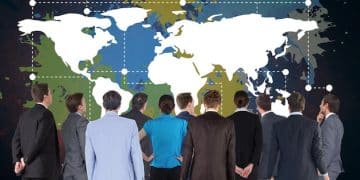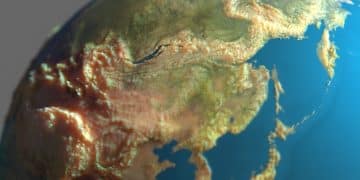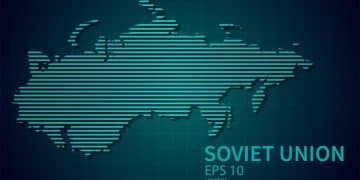Think Tanks’ Role in US Foreign Policy: Influence & Expertise

Advertisements
Think tanks in the US play a crucial, multifaceted role in shaping foreign policy by conducting research, advising policymakers, and fostering public discourse, thereby translating academic expertise into actionable strategies that influence global affairs and national interests.
In the complex tapestry of international relations, understanding how foreign policy is conceived and executed is paramount. Central to this intricate process in the United States are think tanks, often unseen yet profoundly influential organizations. This deep dive explores The Role of Think Tanks in Shaping US Foreign Policy: An Inside Look at Influence and Expertise, dissecting how these intellectual powerhouses contribute to the nation’s global posture.
the evolving landscape of US foreign policy influencers
The traditional pillars of US foreign policy formulation – the State Department, Pentagon, and intelligence agencies – have long been complemented by a dynamic ecosystem of non-governmental actors. Among these, think tanks have emerged as significant forces, offering independent analysis, strategic recommendations, and often, a crucial link between academia and practical policy implementation.
Their growth in number and influence over the past few decades reflects a broader trend towards specialized knowledge and the increasing complexity of global challenges. From economic stability to geopolitical rivalries and climate change, the issues confronting US foreign policy today demand sophisticated, interdisciplinary approaches that traditional governmental structures may struggle to provide unilaterally. Think tanks fill this void, serving as intellectual incubators where nuanced problems can be thoroughly examined.
historic roots and contemporary relevance
The origins of think tanks in the US can be traced back to the early 20th century, spurred by the need for objective research to inform public debate and government action. Institutions like the Carnegie Endowment for International Peace and the Council on Foreign Relations were founded with a mission to promote international understanding and enlightened foreign policy. Their initial roles were often advisory and educational, laying the groundwork for the more expansive influence they wield today.
Contemporary think tanks operate in a vastly different global environment. The rise of instantaneous global communication, the proliferation of data, and the increasing interconnectedness of economies and societies mean that policy challenges are no longer confined to national borders. In this context, think tanks continue to provide essential services:
- independent, non-partisan research on critical global issues.
- platforms for robust debate and diverse perspectives.
- training grounds for future policymakers and diplomats.
- channels for translating complex academic findings into accessible policy briefs.
These institutions are not monolithic; they encompass a wide spectrum of ideological leanings, research methodologies, and engagement strategies. Understanding this diversity is key to appreciating their collective impact on the nation’s foreign policy trajectory.
research and analysis: the bedrock of influence
At the heart of a think tank’s contribution to foreign policy is its capacity for rigorous research and analysis. Unlike governmental bodies that may be constrained by political cycles or bureaucratic procedures, think tanks often possess the agility and long-term perspective necessary to delve deep into persistent or emerging international issues. Their scholars, typically experts in fields ranging from international relations and economics to security studies and area studies, produce a rich body of work that informs various stakeholders.
This research takes many forms, including comprehensive reports, policy briefs, academic papers, and detailed quantitative analyses. The methodology employed is critical; think tanks often leverage proprietary datasets, conduct extensive interviews with global leaders and experts, and engage in sophisticated modeling to forecast geopolitical trends. The goal is not merely to describe problems but to offer actionable solutions, grounded in empirical evidence and expert judgment.

shaping narratives through publications
The publications emanating from think tanks are vital for shaping public discourse and influencing elite opinion. These documents are often consumed by congressional staff, State Department officials, embassy personnel, journalists, and other think tank professionals. A well-researched report can reframe a policy debate, introduce new concepts, or highlight overlooked aspects of a foreign policy challenge. For instance, a report on the economic implications of sanctions could directly influence legislative discussions on trade policy.
The credibility of a think tank’s research is paramount. Reputable institutions adhere to strict standards of objectivity and intellectual integrity, even if they have a clear ideological bent. This commitment to quality ensures that their findings are seen as authoritative and worthy of consideration by policymakers, regardless of partisan alignment. The reputation for factual accuracy and analytical depth allows their insights to penetrate policy circles effectively.
Beyond formal publications, think tanks also utilize a range of other communication channels. Articles in leading newspapers and academic journals, appearances on news programs, and active engagement on social media platforms help disseminate their ideas to a broader audience. This constant output ensures that their research findings and policy recommendations remain Tconsistent considerations in the ongoing dialogue surrounding US foreign policy.
advisory roles and direct engagement with policymakers
Beyond publishing research, think tanks engage directly with policymakers in a variety of capacities, acting as external advisors, conveners, and often, as a rotating door for government officials. This direct interaction is perhaps the most visible and impactful aspect of their influence, providing a channel through which specialized knowledge flows directly into the decision-making process.
Many think tank scholars have prior experience in government, having served in the State Department, Pentagon, National Security Council, or other agencies. This firsthand experience grants them unique insights into the practicalities of policy implementation and the political dynamics within Washington. Conversely, many government officials, upon leaving public service, join think tanks, bringing their expertise and networks with them. This creates a perpetual cycle of knowledge transfer and cross-pollination of ideas.
high-level consultations and testimony
Think tank experts are routinely invited to testify before congressional committees on issues related to foreign policy, national security, and international economics. Their testimony provides lawmakers with in-depth analysis and expert opinions that inform legislative debates, oversight functions, and budget appropriations. These appearances often carry significant weight, as they come from individuals perceived as objective experts rather than partisan advocates.
Moreover, think tank scholars frequently participate in closed-door briefings and consultations with senior government officials. These private sessions allow for frank discussions on sensitive topics, offering policymakers the opportunity to test ideas, solicit feedback, and gain fresh perspectives away from public scrutiny. Such interactions can directly shape grand strategy, diplomatic initiatives, and responses to international crises. The ability to engage discreetly and authoritatively is a key asset that think tanks offer.
- briefings for executive branch officials on emerging threats.
- participation in interagency task forces and working groups.
- providing informal advice to diplomats stationed abroad.
- organizing track II dialogues with foreign counterparts.
The success of these advisory roles hinges on the relevance and timeliness of the insights provided. Think tanks that can anticipate policy needs and offer well-thought-out, practical recommendations are those most frequently tapped for direct engagement.
convening power: fostering discourse and consensus
A distinctive and often underestimated aspect of think tanks’ influence is their convening power. They serve as crucial neutral spaces where diverse stakeholders—policymakers, academics, business leaders, foreign diplomats, journalists, and civil society representatives—can meet, discuss, and debate critical foreign policy issues. These gatherings range from large public conferences and televised panels to small, invitation-only workshops and study groups.
This convening role is particularly important in Washington D.C., where the proliferation of events hosted by think tanks provides a constant stream of intellectual exchange. For instance, a major foreign policy speech by a visiting dignitary is often held at a prominent think tank, lending it an air of intellectual gravity and attracting a targeted audience. Similarly, the launch of a significant report is typically accompanied by a symposium designed to generate discussion and media attention.
building bridges and shaping agendas
By bringing together people from different sectors and political persuasions, think tanks facilitate dialogue that might not otherwise occur. This can lead to the formation of new alliances, the identification of common ground, and sometimes, the emergence of a broad consensus on particular policy directions. For example, a think tank-hosted dialogue on US-China relations could bring together experts from both sides of the aisle, fostering a more nuanced understanding of complex issues and potentially influencing future diplomatic approaches.
Furthermore, these convenings often serve as agenda-setting events. Topics discussed at high-profile think tank forums can gain traction in the media, among policymakers, and within the broader public. This process elevates certain issues to national prominence, compelling policymakers to address them. The intellectual capital generated at these events filters into policy debates, often shaping the parameters of actionable solutions.
- hosting major policy conferences with international participation.
- organizing private roundtables for off-the-record discussions.
- facilitating track 1.5 and track II diplomacy initiatives.
- providing platforms for new voices and dissenting opinions.
The ability of think tanks to create a dynamic marketplace of ideas is vital for a healthy democracy and for ensuring that US foreign policy remains responsive to a rapidly changing world. Their role extends beyond mere research; it is about cultivating an environment where ideas can flourish and converge.
funding, independence, and ethical considerations
The significant influence wielded by think tanks raises important questions about their funding, independence, and the ethical implications of their relationships with various donors and governments. Unlike government entities, think tanks typically rely on a diverse range of funding sources, including philanthropic foundations, corporate donations, government contracts, individual donors, and sometimes, foreign governments.
While this diverse funding model allows for greater operational flexibility and intellectual autonomy compared to directly state-funded research, it also introduces potential conflicts of interest. Critics sometimes raise concerns that certain research outcomes or policy recommendations might be subtly influenced by the interests of major donors. Maintaining intellectual integrity and transparency regarding funding sources is therefore a constant challenge and a critical measure of a think tank’s credibility.
navigating potential conflicts of interest
Reputable think tanks implement rigorous internal policies to safeguard their research independence. These often include:
- blind-review processes for publications.
- disclosures of funding sources where relevant.
- explicit statements affirming editorial independence from donors.
- a commitment to presenting findings based on evidence, regardless of donor preferences.
Despite these safeguards, the perception of undue influence can erode public trust and diminish a think tank’s effectiveness. Therefore, transparency is not just an ethical imperative but also a strategic necessity for maintaining legitimacy in the policy debate. Think tanks that are perceived as merely echoing the views of their funders may find their research dismissed, regardless of its academic merit.
The debate around think tank funding is ongoing, particularly concerning contributions from foreign governments or entities with direct interests in US foreign policy decisions. While such funding can enrich research and broaden international perspectives, it also necessitates heightened scrutiny to ensure that it does not compromise the institution’s independent voice or inadvertently serve as a lobbying channel. Ensuring that funding arrangements do not dictate research agendas or conclusions remains a paramount concern for maintaining scholarly integrity and public trust.
the future of think tanks in a complex world
As the global landscape continues to evolve at an unprecedented pace, the role of think tanks in shaping US foreign policy is likely to become even more critical. The rise of new geopolitical actors, the rapid advancement of technology, and the emergence of non-traditional security threats demand agile and innovative policy responses. Think tanks, with their capacity for deep analysis and their ability to convene diverse expertise, are uniquely positioned to contribute to these challenges.
However, they also face significant challenges. The proliferation of information, including misinformation and disinformation, necessitates an even greater emphasis on rigorous, fact-based research. The increasing polarization of political discourse can make it harder for evidence-based policy recommendations to gain traction. Furthermore, securing sustainable and ethically sound funding remains a perennial concern.
adapting to new realities
To remain relevant and influential, think tanks are continuously adapting their operations and strategies. This includes:
- leveraging new technologies for data analysis and dissemination.
- engaging with a broader and more diverse audience through digital platforms.
- forming global partnerships to tackle transnational issues more effectively.
- focusing on interdisciplinary research to address complex, interconnected problems.
The demand for independent, high-quality analysis on international affairs will only grow. Think tanks that can consistently provide timely, relevant, and objective insights, while upholding the highest ethical standards, will continue to be indispensable partners in the formulation and execution of US foreign policy. Their capacity to bridge the gap between academic theory and practical policy will ensure their enduring impact on how the US navigates the complexities of the 21st century’s international arena.
Their adaptive capacity, coupled with a commitment to intellectual rigor, positions them to not only anticipate future foreign policy challenges but also to craft the innovative solutions required to meet them head-on. The ongoing dialogue and collaboration between think tanks and governmental bodies will remain a cornerstone of effective US engagement on the global stage.
| Key Point | Brief Description |
|---|---|
| 🔬 Research and Analysis | Think tanks provide in-depth, independent research, producing reports and analyses that form the intellectual foundation for policy discussions. |
| 🤝 Advisory & Engagement | Experts directly advise policymakers through testimonies, briefings, and consultations, bridging academic insights with government action. |
| 🌐 Convening Power | They serve as neutral platforms for dialogue, bringing together diverse stakeholders to foster consensus and shape policy agendas. |
| ⚖️ Ethics & Independence | Managing funding transparency and ensuring research independence are crucial for maintaining credibility and trust. |
frequently asked questions about think tanks and foreign policy
A think tank is a research institute that performs research and advocacy concerning topics such as social policy, political strategy, economy, or foreign policy. Unlike universities, which prioritize academic instruction and fundamental research, think tanks typically focus on applied research with direct policy implications, aiming to influence current governmental decisions and public debate.
Think tanks gain influence primarily through their research publications, expert testimonies before Congress, direct consultations with government officials, and by convening events that bring together policymakers, academics, and other stakeholders. Many of their scholars also have prior government experience, creating a valuable network and knowledge transfer.
The independence of think tanks is a subject of ongoing debate. While many strive for impartiality and have strict internal policies to ensure research integrity, their funding sources (foundations, corporations, governments) can sometimes create perceived or actual conflicts of interest. Transparency about funding is crucial for maintaining public trust and academic credibility.
Think tanks play a significant role in public discourse by translating complex foreign policy issues into accessible formats for broader audiences. They host public events, publish articles in mainstream media, and engage on social media, thereby helping to inform public opinion and shape the national conversation around international affairs and US global engagement.
Most reputable think tanks generally avoid direct lobbying to maintain their non-profit status and their perception as objective research institutions. Their influence comes from providing research and expert analysis that informs policymakers, rather than explicit advocacy for specific legislation or actions. However, the line between informing and influencing can sometimes be subtle.
conclusion: essential pillars of foreign policy formation
Think tanks represent an indispensable component of the US foreign policy apparatus. Their unique combination of intellectual rigor, practical experience, and convening power allows them to contribute significantly to the nation’s global strategy. Through their research, direct engagement with policymakers, and role as neutral forums for discourse, they help bridge the gap between academic theory and the realities of governance. While navigating challenges related to funding and independence, their sustained relevance underscores a fundamental truth: in an increasingly complex world, the need for informed, nuanced, and forward-thinking foreign policy analysis is more critical than ever. As the global landscape continues to shift, the adaptive capacity and enduring commitment to expertise within think tanks will ensure their continued role in shaping how the United States confronts the foreign policy challenges of tomorrow.





